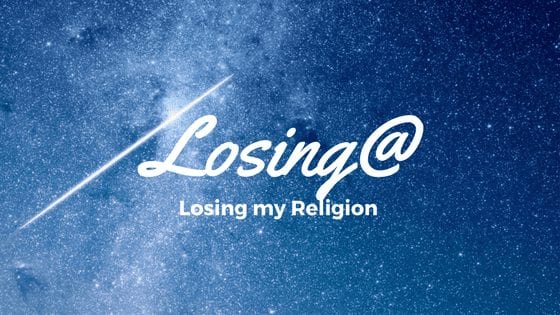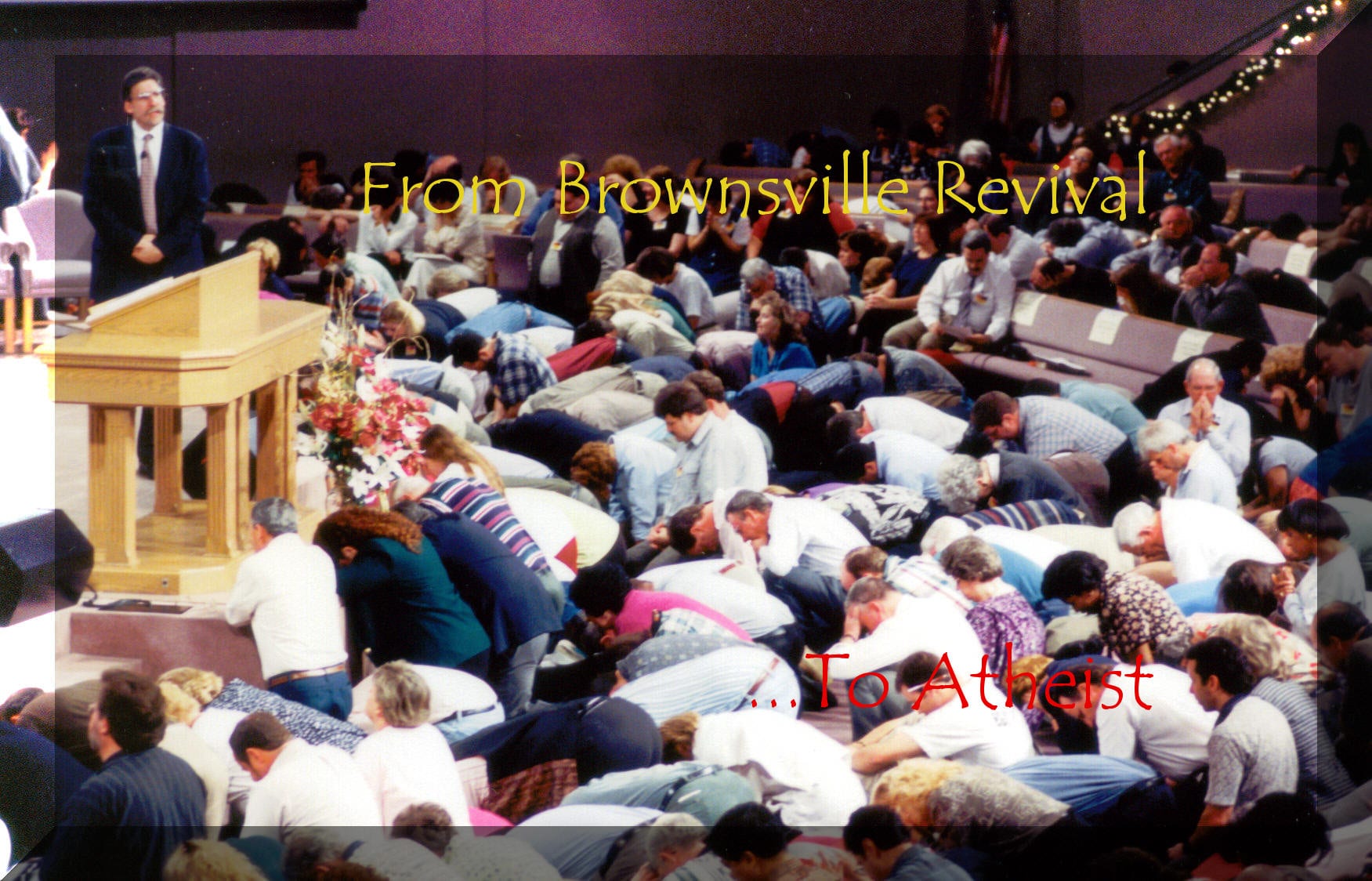For just over 10 years now I’ve been an atheist, an ex-Christian. After losing my religion I starting sharing the story of that journey, my difficulties with the church, and many of your stories as well. I’ve been talking privately with dozens of people ever since the first time I wrote down my story, and I’ve been touched by what it’s meant to you – and what your stories have meant to me.
During the first few years after I left the faith, I found myself driven toward kicking against the church with as much vigor as I could. I needed to see it’s defeat and I needed it to be done at my hands. I felt like everything leading up to my awakening had been a giant deception, and that was true – people, adult people – had lied to me in order to control me. They used their influence to teach me that my beliefs about god were determining factors in my eternity. I eventually modeled their behavior. I did the same thing to others. I also became as self deprecating as they were, as I learned to hate all the parts of myself that couldn’t meet the standards set forth by my benevolent but jealous god.
Eventually my vigor waned. I became more concerned about social justice; LGBT rights, the lives of black and brown people, the treachery of warmongering and death in countries inhabited by people poorer than anyone reading this can fathom, and the importance of separating church from state. It became clear to me that what was important was not my insistence on godlessness and controversy, but instead on humanity and the philosophical ideology of humanism and what reaching it’s ends would look like for underprivileged people. I thought – and maintain, that the church will destroy itself with no help from me. It will implode by the force of the immense anger and hate machine that churns inside it.
Once I got over the anger that accompanied the grief of losing my faith, I convinced myself that I’d eventually be able to stop grieving. I thought that I’d one day no longer feel the pang of loss when I thought about god. I thought that 10 years might be enough. That hasn’t been found to be true yet. Instead, my ache has ebbed and flowed like the tide.
This last six months or so has been one of those periods where my grief has been more prevalent than others. While it’s not necessarily accompanied by the depression it normally is, it is accompanied by a great deal of longing. The longing is for something I’m having a hard time figuring out.
Longing for what exactly?
This past December I started seeing advertisements for a church in my news-feed. It was a new church, with a new pastor – and I knew, with the frequency with with that their ads were showing up in my feed that they must be targeting people with some sort of demographic that I fit in. I also noticed that many of my other atheists friends had engaged with the advertisements – so, the assumption became that “atheist” must be one of the demographics they were after.
As a result of that realization, I decided to engage with the post, which resulted in having lunch with the pastor, Drew.
I’ve never, in all the years and in all the lunches I’ve had with people in the ministry, been listened to so fervently than I did that day and in the meetings following. Drew wanted to know where the church was failing, he wanted to know where to minister in his city, he wanted to hear me rip his church to shreds. I did. It felt good, and it felt good to be heard. To have the right audience for all the things I say in this blog hear it, receive it, and know that my experience and not my arrogance lead me to my conclusions was therapeutic.
He later invited me to lunch with the children’s pastor and youth group pastor so that I could do the same thing. They too listened. They knew, unlike every other pastor I had sat across a table with, that I had experienced this faith and that I loved the Church deeply.
Those conversations have reminded me how much I long for belonging in the Church. They remind me how much I feel entitled to be there, as if there is a place for me somewhere there – but there’s this problem of belief that I can’t reconcile, and I don’t reckon many will be able to either. I feel like I’ve lost access to my children in a nasty divorce.
Someone make sense of that for me.
Prophets Prophesy
Since the beginning of all this it’s been abundantly clear from many that I’m expected to return to the fold. My mother has said that she believes I’ll come back and that I’ll do “great things”, others too have said similar things – almost like they are prophesying these sayings over my life.
I don’t believe them, of course. I know it’s wishful thinking. If my own prayer can’t get me to remain, what can? If my petitions to god cannot help my unbelief – why would god hear anyone’s on my behalf?
I have long thought about what that would look like though. A triumphant return of the prodigal, met with tears of joy, lots of “I told ya so’s”, and expectations about what to do with me next. And then I remember that they wouldn’t have me.
I’m too much of a radical for Western Christianity, it’s my radicalism that led me to doubt in the first place. I remember now that I never did have a home in the Church. I probably never can.
What good is a Christian who despises the money changers in the temple when his local churches are building multi-million dollar complexes and fail to provide more than menial supplements to the poor when they are in need. What good is a Christian who believes that the Gospel is meant to be freely given when pastors expect 6 figure salaries. How is there a place for a Christian like that anywhere in the Church, much less one who has been stricken with disbelief?
I think I’m far more palatable to the Christians that know me as an atheist than I would be to them if I were a Christian, what with all of the fervency with which I would believe. I’m frustrated by that.
Reconciliation
For the longest time I’ve found myself arguing for different versions of the Christian faith in order to find what I believe it was meant to be. I’m trying to reconcile my knowledge about the faith with my inability to believe in it, which looks strange as an outsider and feels more strange as the person doing it.
I often find myself thinking, “if Christianity is true, X is the version that seems most right – but Christianity isn’t true so why am I obsessed with which version is correct?” and yet, I am. I want, desperately to find Jesus somewhere in it – I want for him to be at the center of the faith and a piece of me believes that if I were able to find that I’d be able to reconcile my doubt. I’d be able to believe again.
All the hundreds of times I’ve made that petition, the sky has returned the same empty reply. I’ve not, despite all attempts, been able to quiet the doubts in order to find the faith. That’s how it worked for me, my faith was strong and loud and unavoidable until the whispers of doubt became a roar that drowned it all out. I know of no mechanism with which to adjust the volume on either knob aside from the simplicity of a change in perspective, which I also don’t believe I have access to force upon myself.
And so I sit here in disbelief. It hasn’t changed and suspect that’s where things will remain; an ex-christian unable to quiet his doubts long enough to find a mustard seed while he continues to tell people what Jesus would do if…you know, he believed in Jesus.
That’s not…weird.
Satisfaction
I guess one of the prevailing themes of a constant and unending search for something that isn’t there is that you never get to experience the joy of finding it. Satisfaction never comes. I’ve succumbed to that reality, it’s canonized into my understanding of myself.
I’ll always search.
He’ll always not be there.
I’ve found out that, while I struggle with being joyous about that truth – that I’m still by and large a happy person. I still love people, I still care for those who need to be cared for, I still try to eschew kindness to as many people as I can, I try to use my life to make a small difference in the world. Yet, I ache.
Sometimes you have to embrace the ache since it confirms that your’e alive. I guess that’s where I’m at. I can be sad and I can be happy too.

